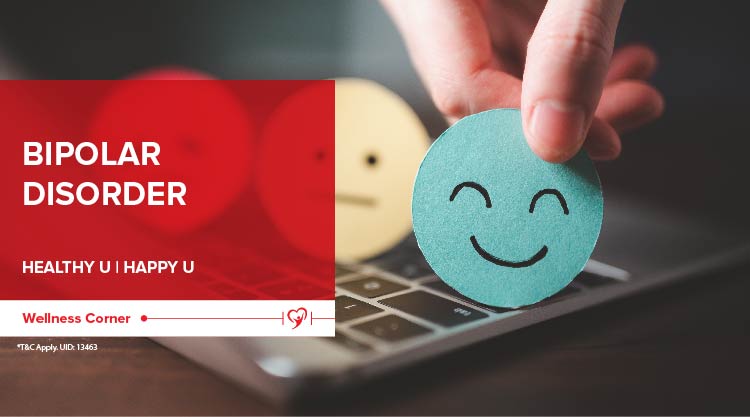

What is Bipolar Disorder?
Overview
We all have mood swings that include emotional highs and lows, but with bipolar disorder these ups and downs are more severe. Formerly known as manic-depressive illness or manic depression, bipolar disorder is a mood disorder and mental health condition that causes intense shifts in mood, energy, thinking, and behaviour. These mood swings include emotional highs (mania or hypomania) and lows (depression) and they can last for hours, days, weeks, or months interrupting your ability to carry out daily activities.
Celebrities such as Demi Lovato, Catherine Zeta-Jones, and Honey Singh have publicly shared their experiences with bipolar disorder, demonstrating resilience and raising awareness about mental health challenges. This also helped to reduce the stigma surrounding mental health issues & inspired people to seek support & treatment. Although bipolar disorder is a lifelong condition, the mood swings & other symptoms can be managed by undergoing treatment.
Let’s learn about the types & causes of bipolar disorder, symptoms, potential complications, different therapeutic and treatment options available, and various myths & facts associated with the condition to help individuals navigate through the challenges of this disease.
Types of Bipolar Disorder
There are 4 types of bipolar disorder:
1. Bipolar I disorder
This is a severe form of bipolar disorder where an individual either experiences one or more episodes of mania which lasts for at least seven days or the episodes are so severe and extreme that one will need immediate medical attention. People with this type of bipolar disease can experience both mania and depressive episodes, but depression is not necessary to diagnose this disorder. The depressive episodes usually last at least two weeks and if a person experiences more than four mania or depression episodes in a year, it is called rapid cycling.
2. Bipolar II disorder
In this type, people experience depressive and hypomanic (less severe form of mania) episodes. The person must have had one or more bouts of depression lasting 2 weeks or longer, along with at least one hypomanic episode that lasts four or more days but no manic episodes. If there are symptoms of mania, it will be diagnosed as Bipolar I.
3. Cyclothymic disorder
This is a rare type of bipolar disorder in which the individual experiences hypomania and depression, on and off, for at least 2 years. The symptoms are usually less severe than bipolar I or bipolar II, but it does affect the daily life of those diagnosed with this disorder.
4. Other specified and unspecified bipolar & related disorders
Sometimes, people may experience mood swings which may not be that severe and long-lasting, like bipolar I, bipolar II, and cyclothymic disorders. This is termed as other specified and unspecified bipolar disorder.
Symptoms of Bipolar Disorder
Bipolar disorder symptoms can vary based on the type of disorder.
Symptoms of Manic episode
- Abnormally happy, jumpy or excited
- Full of energy
- Extreme sense of well-being and self-confidence (euphoria)
- Decreased need for sleep
- Excessive talking and talking rapidly
- Racing thoughts
- Restlessness
- Getting easily distracted
- Poor judgement, such as going on buying sprees, suddenly quitting jobs, or making unnecessary investments
- Sudden and severe mood swings
- Experiencing hallucinations and delusions in severe episodes
- Feeling self-important
- Getting irritated or agitated easily
Symptoms of Depressive episode
- Feelings of sadness, worthlessness, or hopelessness
- Feelings of loneliness or isolating oneself from others
- Feelings of guilt and despair
- Talking very slowly, like the person has nothing to say, or forgetting a lot
- Loss of energy, fatigue
- Sleeping too much or having difficulty sleeping
- Eating too much or too little
- Lack of interest in usual activities and being unable to do even simple things
- Suicidal thoughts
- Lack of motivation
- Pessimistic about everything
- Unable to concentrate or think
Symptoms of Mixed episode
When a person experiences episodes of mania and depression together, they are the bipolar disorder symptoms of a mixed episode. For instance, one moment, you will feel depressed with feelings of loneliness and sadness; the next, you will feel extremely hyperactive and energised.
Causes of Bipolar Disorder
There are no known causes of bipolar disorder, but researchers believe there are some factors which contribute to the development of the disease:
- Heredity: If bipolar disorder runs in the family, there is 10% to 25% risk of you developing it. This means if your parent or sibling suffers from this disorder, you have a high chance of getting it.
- Brain: Any irregularities in the brain structure may increase the risk of bipolar disorder.
- Environmental factors: such as a severe illness, extreme stress and traumatic event, may trigger an episode.
Risk Factors
1. Emotional Instability
Bipolar disorder can impact an individual's emotional stability, leading to extreme mood swings. People with bipolar disorder experience episodes of mania characterised by heightened energy, euphoria, and impulsivity, followed by periods of depression marked by low mood, lack of interest, and despair.
2. Impaired Relationships
The erratic nature of bipolar disorder can strain relationships with family, friends, and partners. Individuals may exhibit reckless behaviour, irritability, and impulsiveness, which can be challenging for loved ones to comprehend and cope with. Conversely, depressive episodes can lead to withdrawal, isolation, and difficulty engaging in social activities, causing strain on interpersonal connections.
3. Occupational and Academic Challenges
Bipolar disease can interfere with an individual's ability to perform consistently in work or educational settings. During manic phases, excessive energy and distractibility may result in poor concentration and decision-making, leading to mistakes and decreased productivity. Conversely, depressive episodes can cause fatigue, lack of motivation, etc.
4. Financial Burden
Individuals may engage in impulsive spending sprees or risky financial ventures without considering the long-term consequences. The subsequent depressive episodes may result in inability to work which can lead to financial instability, debt, and difficulties in meeting financial commitments.
5. Physical Health Complications
Irregular sleep patterns can lead to sleep deprivation that can cause detrimental effects on overall well-being. Additionally, the lifestyle choices associated with bipolar disorder, such as substance abuse or neglecting self-care, can increase the risk of developing health problems like cardiovascular issues, diabetes, and obesity.
Diagnosis
Diagnosis is usually based on the person’s bipolar disorder symptoms, medical history, family history, etc. To be diagnosed with bipolar disorder, the person must have experienced at least one episode of mania. The medical practitioner will ask about your medical history and conduct physical examination & blood tests to rule out other possible causes, such as hyperthyroidism. They may also evaluate your mental health condition or refer you to specialists such as psychologists or psychiatrists.
Treatment & Therapy
Treatments for bipolar disorder usually involve a combination of the below-listed options:
- The most commonly prescribed medications include mood stabilisers, atypical antipsychotics, antidepressant-antipsychotics, and anti-anxiety drugs.
- Psychotherapy or talk therapy can help people identify and change thoughts, behaviour, and emotions that trouble them.
- Other therapies, such as electroconvulsive therapy (ECT), are recommended for people with severe symptoms and for those who do not respond to medications. These therapies are also suggested when there is a need to rapidly control the symptoms in order to stop a person from taking extreme measures like committing suicide.
- Certain lifestyle modifications can help reduce the severity of symptoms. These include following a balanced diet, regular physical exercise, meditation, managing stress, maintaining a healthy sleep schedule, etc.
- Acupuncture
- Counselling
Myths and Facts about Bipolar Disorder
1. Myth: People suffering from bipolar disorder can’t get better or lead a normal life.
Fact: Though living with bipolar disorder is challenging, with right treatment and support from family and friends you can manage your symptoms & live life fully.
2. Myth: People with bipolar disorder swing back and forth between mania & depression.
Fact: While some people alternate between extreme episodes of mania and depression, most people are often depressed than they are manic. People with this condition can also go for long without showing any symptoms.
3. Myth: Bipolar disorder only affects mood.
Fact: Apart from mood, this disease also affects energy level, capability to judge, memory skills & concentration, appetite, sleep patterns, self-esteem, and sexual urge. Additionally, this condition has also been linked to other issues like anxiety, substance abuse, diabetes, heart disease, migraine, and high blood pressure.
4. Myth: Except medications, there is nothing you can do to control bipolar disorder symptoms.
Fact: While medication plays a crucial role, therapy & self-help strategies is also important. Exercising regularly, getting enough sleep, healthy eating, monitoring your moods, avoiding situation that can trigger stress, & staying with supportive people can help control symptoms.
Conclusion
Bipolar disorder is a lifelong condition that requires long-term treatment as it can disrupt a person’s life. But with proper diagnosis, medication for bipolar disorder, and support from family & healthcare practitioner, individuals with bipolar disorder can lead a fulfilling life, and manage the potential risks and challenges associated with this condition. Understanding about this disorder and symptoms associated with it can help seek medical attention before it gets severe.
Frequently Asked Questions
1. When is the typical onset of symptoms for Bipolar Disorder?
The average age of symptom onset is 25, although children and teenagers also can develop symptoms.
2. Can children be diagnosed with Bipolar Disorder?
Symptoms of bipolar disorder typically emerge in early adulthood, but symptoms can also develop in childhood or the teenage years. Symptoms of the condition may manifest differently in children and teens, with irritability often replacing sad mood for depression or elevated mood for mania.
3. Can Bipolar Disorder be cured?
Bipolar disorder is a chronic condition, meaning it lasts for a lifetime. But the condition is very treatable, and symptoms can be managed with the right combination of medication, therapy, and psycho-education.
4. What is the standard treatment for Bipolar Disorder?
Most people find that treating the symptoms of bipolar disorder requires a combination of medication, psychotherapy, and psycho-education. Sometimes substance use treatment, intensive outpatient programs, and hospitalization are necessary as well.
5. How can I help a loved one with Bipolar Disorder?
Encourage your loved one to consult with their doctor about their concerns. Point out your observations about how the disorder may be affecting their daily life. If they are experiencing delusions, hallucinations, or thoughts of suicide, then seek help immediately.
Source: my.clevelandclinic, nimh.nih.gov, medicalnewstoday, healthline, webmd, mayoclinic, helpguide, psycom.net
Get a right Health Insurance today & protect your savings from unexpected medical expenses.
Treating mental health issues to ensure your well-being is crucial. But sometimes, psychiatric treatments can be expensive, burning a hole in your pocket. Get a medical insurance policy that covers such expenses to ensure your health gets the security it deserves.
Disclaimer: This blog provides general information and discussions about health and related subjects. The information and other content provided in this blog, website or in any linked materials are not intended and should not be considered, or used as a substitute for, medical advice, diagnosis or treatment. Kindly contact your Doctor before starting a new medicine or health regime.

/depression-s.png?sfvrsn=b52f5645_2)
/anxiety-s.png?sfvrsn=677783ac_2)
/stress-s.png?sfvrsn=b03e73f9_2)












 Car Insurance
Car Insurance  Bike/Two Wheeler Insurance
Bike/Two Wheeler Insurance  Health Insurance
Health Insurance  Pet Insurance
Pet Insurance  Travel Insurance
Travel Insurance  Home Insurance
Home Insurance  Cyber Insurance
Cyber Insurance  Third Party Vehicle Ins.
Third Party Vehicle Ins.  Tractor Insurance
Tractor Insurance  Goods Carrying Vehicle Ins.
Goods Carrying Vehicle Ins.  Passenger Carrying Vehicle Ins.
Passenger Carrying Vehicle Ins.  Compulsory Personal Accident Insurance
Compulsory Personal Accident Insurance  Travel Insurance
Travel Insurance  Rural
Rural  Critical illness Insurance
Critical illness Insurance 










